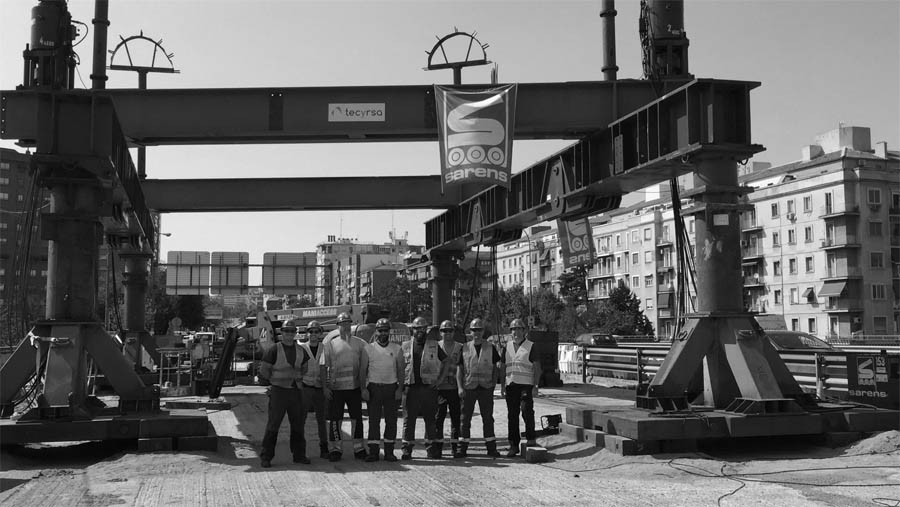
From August through September, Sarens has been helping with emergency bridge repairs on the M30 highway in Madrid, a project with a tight 44-day timeline. (You can view the video of the operation here.)
The Avenida del Mediterráneo bridge was constructed in 1955 as the first bridge on Madrid's M30 ring road. The bridge had been partially repaired seven years ago, but damage to the bearing supports on both central spans had become even worse with time. For a definitive repair, it was necessary to lift the bridge spans, free the old bearing supports, and completely renovate the bridge edges and final bearings.
As part of the emergency repair operation, Sarens supplied the steel and hydraulic equipment necessary to lift and lower two central concrete spans, each weighing 450 tonnes. The following equipment was used:
Sarens was quick to gather and assemble its resources, preparing everything for operation within 20 working days from receiving the client's call. The equipment was taken to the site via truck from Sarens headquarters, a 3-day trip each way. Sarens operators worked double shifts day and night in order to set up the equipment on-site.
Because of the significant traffic flow (about 1,5 million cars use the M30 each day), all bridge repair work had to be conducted at night during the weekend, when the M30 section could be closed. One of the biggest challenges was performing the complete lift operation in a single night shift of just nine working hours.
During the operation, Sarens discovered that the bridge spans were connected to the bridge at one of the edges, instead of with isostatic support. That meant that on one side, the bridge was not lifting with +46% of the expected weight. Sarens' client had to use hydro demolition to release as much of the hidden connection as possible, and Sarens controlled, step-by-step, the freeing of the connections by applying small load steps on each SJ.
Sarens was involved in the project from the initial technical stage to the execution, performing the lift on behalf of client TECYRSA. The owner of the project is Madrid Calle M30, with structural engineering and technical assistance provided by LRA.
"An emergency bridge repair, in itself, requires harder and faster work than normal bridge repairs," says José María Martínez Gutiérrez, Technical Proposal Manager, Technical Solution Sales for Sarens. "This is the first repair of its kind in Madrid, which is full of bridges, and most probably in Spain."
Sarens Spain employs nearly twenty people and is responsible for a number of projects in the region, like this bridge repair. We spoke to Mr. Gutiérrez about other dynamics playing out in Spain, from current projects in the region to its future outlook, and this is what he had to say:
How optimistic are you about the growth of Sarens in Spain?
Despite the Spanish meltdown we've been suffering during the last ten years (and are still feeling), the Spain division has continuously increased in size. From three people operating out of a single room in a business center, we have grown up and moved to a Sarens office in the center of the city, with room for up to 30 employees.
We're seeing an increase in the number of TS orders from Spanish clients (both in and out of Spain), so there is no reason to believe this trend won't continue.
Which business sectors do you think will be key drivers of heavy lifting and transport growth in Spain?
In Europe, wind offshore is one of the main sectors experiencing growth. Although no major offshore wind farms are foreseen in Spanish waters, some of the main Spanish harbor yards are scoring important orders for manufacturing jackets, topsides, etc. related to this sector. This will keep them busy for at least the next couple of years.
The civil sector is still far from yearly budget levels, and we really hope this will change in the near future as the civil sector pushes many others. Other sectors, including nuclear and oil & gas, are on hold as we see how the country's political and economic situation develops.
Are there any new projects in the pipeline?
Prior to 2015, we completed a few small projects but were relatively unknown to Spanish clients. Since then, we've had more and bigger projects, and in 2017 this included:
We actually have more than 60 offers running and a good number of them are BFB for the following years. This growth would not have been possible without the great support we receive from HQ, especially since Pieter Augustyns was appointed in 2016. Working with and learning from him has been a real pleasure, and the results speak for themselves.
What do you believe are Sarens' key strengths?
Our strengths are our experience, deep knowledge, and the trust clients place in us.
In my two and a half years experience with this Sarens office, I have experienced firsthand the deep commitment and countless hours my colleagues (and I) put into our work. It is not only the amount of work, but also the good atmosphere that most of the time fills the air. Six different nationalities mean that one out of every three people is from a different country or culture, and has a different way of working, but I am convinced we get along pretty well! Sometimes it seems like the Babel Tower, but in fact that's part of the spirit and success of our entrepreneurial and multinational company, isn't it?